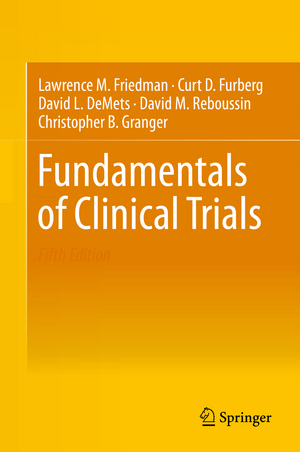Fundamentals of Clinical Trials
Autor Lawrence M. Friedman, Curt D. Furberg, David L. DeMets, David M. Reboussin, Christopher B. Grangeren Limba Engleză Hardback – 12 sep 2015
This book is intended for the clinical researcher who is interested in designing a clinical trial and developing a protocol. It is also of value to researchers and practitioners who must critically evaluate the literature of published clinical trials and assess the merits of each trial and the implications for the care and treatment of patients. The authors use numerous examplesof published clinical trials to illustrate the fundamentals.
The text is organized sequentially from defining the question to trial closeout. One chapter is devoted to each of the critical areas to aid the clinical trial researcher. These areas include pre-specifying the scientific questions to be tested and appropriate outcome measures, determining the organizational structure, estimating an adequate sample size, specifying the randomization procedure, implementing the intervention and visit schedules for participant evaluation, establishing an interim data and safety monitoring plan, detailing the final analysis plan and reporting the trial results according to the pre-specified objectives.
Although a basic introductory statistics course is helpful in maximizing the benefit of this book, a researcher or practitioner with limited statistical background would still find most if not all the chapters understandable and helpful. While the technical material has been kept to aminimum, the statistician may still find the principles and fundamentals presented in this text useful.
| Toate formatele și edițiile | Preț | Express |
|---|---|---|
| Paperback (1) | 415.67 lei 3-5 săpt. | |
| Springer International Publishing – 30 aug 2015 | 415.67 lei 3-5 săpt. | |
| Hardback (1) | 463.52 lei 3-5 săpt. | +43.40 lei 7-13 zile |
| Springer International Publishing – 12 sep 2015 | 463.52 lei 3-5 săpt. | +43.40 lei 7-13 zile |
Preț: 463.52 lei
Preț vechi: 545.32 lei
-15% Nou
Puncte Express: 695
Preț estimativ în valută:
88.69€ • 92.94$ • 73.32£
88.69€ • 92.94$ • 73.32£
Carte disponibilă
Livrare economică 22 martie-05 aprilie
Livrare express 08-14 martie pentru 53.39 lei
Preluare comenzi: 021 569.72.76
Specificații
ISBN-13: 9783319185385
ISBN-10: 3319185381
Pagini: 550
Ilustrații: XXI, 550 p. 49 illus., 7 illus. in color.
Dimensiuni: 155 x 235 x 38 mm
Greutate: 1.04 kg
Ediția:5th ed. 2015
Editura: Springer International Publishing
Colecția Springer
Locul publicării:Cham, Switzerland
ISBN-10: 3319185381
Pagini: 550
Ilustrații: XXI, 550 p. 49 illus., 7 illus. in color.
Dimensiuni: 155 x 235 x 38 mm
Greutate: 1.04 kg
Ediția:5th ed. 2015
Editura: Springer International Publishing
Colecția Springer
Locul publicării:Cham, Switzerland
Public țintă
Professional/practitionerCuprins
Introduction to Clinical Trials.- Ethical Issues.- What is the Question?.- Study Population.- Basic Study Design.- The Randomization Process.- Blinding.- Sample Size.- Baseline Assessment.- Recruitment of Study Participants.- Data Collection and Quality Control.- Assessment and Reporting of Harm.- Assessment of Health Related Quality of Life.- Participant Adherence.- Survival Analysis.- Monitoring Committee Structure & Function.- Statistical Methods Used in Interim Monitoring.- Issues in Data Analysis.- Closeout.- Reporting and Interpreting of Results.- Multicenter Trials.- Regulatory Issues.
Recenzii
“This book aims to assist investigators in improving the quality of their clinical trials and protocols by discussing fundamental concepts with examples and in-depth review of the literature. … This is a valuable resource for students, clinicians, and researchers who are interested in designing a clinical trial or in critically appraising the published literature on clinical trials.” (Pooja Sethi, Doody’s Book Reviews, December, 2015)
Notă biografică
Lawrence M. Friedman received his M.D. from the University of Pittsburgh. After training in internal medicine, he went to the National Heart, Lung and Blood Institute of the National Institutes of Health. During his many years there, Dr. Friedman was involved in numerous clinical trials and epidemiology studies, having major roles in their design, management and monitoring. While at the NIH and subsequently, he served as a consultant on clinical trials to various NIH institutes and to other governmental and nongovernmental organizations. Dr. Friedman has been a member of many data monitoring and other safety committees.
Curt D. Furberg is Professor Emeritus of the Division of Public Health Sciences of the Wake Forest University School of Medicine. He received his M.D. and Ph.D. at the University of Umea, Sweden, and is a former chief, Clinical Trials Branch and Associate Director, Clinical Applications and Prevention Program, National Heart, Lung, and Blood Institute. Dr. Furberg established the Department of Public Health Sciences and served as its chair from 1986 to 1999. He has played major scientific and administrative roles in numerous multicenter clinical trials and has served in a consultative or advisory capacity on others. Dr. Furberg’s research activities include the areas of clinical trials methodology and cardiovascular epidemiology.
David L. DeMets, PhD is currently the Max Halperin Professor of Biostatistics and former Chair of the Department of Biostatistics and Medical Informatics at the University of Wisconsin – Madison He has co-authored numerous papers on statistical methods and four texts on clinical trials, two specifically on data monitoring. He has served on many NIH and industry-sponsored data monitoring committees for clinical trials in diverse disciplines. He served on the Board of Directors of the American Statistical Association, as well as having been President of the Society for Clinical Trialsand President of the Eastern North American Region (ENAR) of the Biometric Society. In addition he was Elected Fellow of the International Statistics Institute, the American Statistical Association, the Association for the Advancement of Science, the Society for Clinical Trials and the American Medical Informatics Association. In 2013, he was elected as a member of the Institute of Medicine.
Christopher B. Granger is Professor of Medicine at Duke University, where he is an active clinical cardiologist and a clinical trialist at the Duke Clinical Research Institute. He received his M.D. at University of Connecticut and his residency training at the University of Colorado. He has had Steering Committee, academic leadership, and operational responsibilities for many clinical trials in cardiology. He has been on numerous Data Monitoring Committees. He serves on the National Heart, Lung, and Blood Institute Board of External Experts. He works with the Clinical Trials Transformation Initiative, a partnership between the U.S. Food and Drug Administration and Duke aiming to increase the quality and efficiency of clinical trials. He is a founding member of the Sensible Guidelines for the Conduct of Clinical Trials group, a collaboration between McMaster, Oxford, and Duke Universities.
David M. Reboussin is a Professor in the Department of Biostatistical Science at the Wake Forest University School of Medicine, where he has worked since 1992. He has a master’s degree in Statistics from the University of Chicago and received his doctorate in Statistics from the University of Wisconsin at Madison. He is currently Principle Investigator for the Systolic Blood Pressure Intervention Trial Coordinating Center and has been a co-investigator in the coordinating centers for several NIH and industry funded clinical trials including Action to Control Cardiovascular Risk in Diabetes (ACCORD), Action for Health in Diabetes (Look AHEAD), the Combined Oral and Nutritional Treatment of Late-Onset Diabetes Trial (CONTROL DM) and the Estrogen Replacement and Atherosclerosis (ERA) Trial. Dr. Reboussin has served on the Data and Safety Monitoring Boards for many National Institutes of Health trials within areas including cardiology, diabetes, nephrology, pulmonology, liver disease, psychiatry, pediatrics, weight loss and smoking cessation. His work in statistical methodology has included techniques and software for sequential monitoring of clinical trials.
Curt D. Furberg is Professor Emeritus of the Division of Public Health Sciences of the Wake Forest University School of Medicine. He received his M.D. and Ph.D. at the University of Umea, Sweden, and is a former chief, Clinical Trials Branch and Associate Director, Clinical Applications and Prevention Program, National Heart, Lung, and Blood Institute. Dr. Furberg established the Department of Public Health Sciences and served as its chair from 1986 to 1999. He has played major scientific and administrative roles in numerous multicenter clinical trials and has served in a consultative or advisory capacity on others. Dr. Furberg’s research activities include the areas of clinical trials methodology and cardiovascular epidemiology.
David L. DeMets, PhD is currently the Max Halperin Professor of Biostatistics and former Chair of the Department of Biostatistics and Medical Informatics at the University of Wisconsin – Madison He has co-authored numerous papers on statistical methods and four texts on clinical trials, two specifically on data monitoring. He has served on many NIH and industry-sponsored data monitoring committees for clinical trials in diverse disciplines. He served on the Board of Directors of the American Statistical Association, as well as having been President of the Society for Clinical Trialsand President of the Eastern North American Region (ENAR) of the Biometric Society. In addition he was Elected Fellow of the International Statistics Institute, the American Statistical Association, the Association for the Advancement of Science, the Society for Clinical Trials and the American Medical Informatics Association. In 2013, he was elected as a member of the Institute of Medicine.
Christopher B. Granger is Professor of Medicine at Duke University, where he is an active clinical cardiologist and a clinical trialist at the Duke Clinical Research Institute. He received his M.D. at University of Connecticut and his residency training at the University of Colorado. He has had Steering Committee, academic leadership, and operational responsibilities for many clinical trials in cardiology. He has been on numerous Data Monitoring Committees. He serves on the National Heart, Lung, and Blood Institute Board of External Experts. He works with the Clinical Trials Transformation Initiative, a partnership between the U.S. Food and Drug Administration and Duke aiming to increase the quality and efficiency of clinical trials. He is a founding member of the Sensible Guidelines for the Conduct of Clinical Trials group, a collaboration between McMaster, Oxford, and Duke Universities.
David M. Reboussin is a Professor in the Department of Biostatistical Science at the Wake Forest University School of Medicine, where he has worked since 1992. He has a master’s degree in Statistics from the University of Chicago and received his doctorate in Statistics from the University of Wisconsin at Madison. He is currently Principle Investigator for the Systolic Blood Pressure Intervention Trial Coordinating Center and has been a co-investigator in the coordinating centers for several NIH and industry funded clinical trials including Action to Control Cardiovascular Risk in Diabetes (ACCORD), Action for Health in Diabetes (Look AHEAD), the Combined Oral and Nutritional Treatment of Late-Onset Diabetes Trial (CONTROL DM) and the Estrogen Replacement and Atherosclerosis (ERA) Trial. Dr. Reboussin has served on the Data and Safety Monitoring Boards for many National Institutes of Health trials within areas including cardiology, diabetes, nephrology, pulmonology, liver disease, psychiatry, pediatrics, weight loss and smoking cessation. His work in statistical methodology has included techniques and software for sequential monitoring of clinical trials.
Textul de pe ultima copertă
This is the fifth edition of a very successful textbook on clinical trials methodology, written by recognized leaders who have long and extensive experience in all areas of clinical trials. The three authors of the first four editions have been joined by two others who add great expertise. Most chapters have been revised considerably from the fourth edition. A chapter on regulatory issues has been included and the chapter on data monitoring has been split into two and expanded. Many contemporary clinical trial examples have been added. There is much new material on adverse events, adherence, issues in analysis, electronic data, data sharing, and international trials.
This book is intended for the clinical researcher who is interested in designing a clinical trial and developing a protocol. It is also of value to researchers and practitioners who must critically evaluate the literature of published clinical trials and assess the merits of each trial and the implications for the care and treatment of patients. The authors use numerous examples of published clinical trials to illustrate the fundamentals.
The text is organized sequentially from defining the question to trial closeout. One chapter is devoted to each of the critical areas to aid the clinical trial researcher. These areas include pre-specifying the scientific questions to be tested and appropriate outcome measures, determining the organizational structure, estimating an adequate sample size, specifying the randomization procedure, implementing the intervention and visit schedules for participant evaluation, establishing an interim data and safety monitoring plan, detailing the final analysis plan, and reporting the trial results according to the pre-specified objectives.
Although a basic introductory statistics course is helpful in maximizing the benefit of this book, a researcher or practitioner with limited statistical background would still find most if not all the chapters understandable and helpful. While the technical material has been kept to a minimum, the statistician may still find the principles and fundamentals presented in this text useful. This book has been successfully used for teaching courses in clinical trial methodology.
This book is intended for the clinical researcher who is interested in designing a clinical trial and developing a protocol. It is also of value to researchers and practitioners who must critically evaluate the literature of published clinical trials and assess the merits of each trial and the implications for the care and treatment of patients. The authors use numerous examples of published clinical trials to illustrate the fundamentals.
The text is organized sequentially from defining the question to trial closeout. One chapter is devoted to each of the critical areas to aid the clinical trial researcher. These areas include pre-specifying the scientific questions to be tested and appropriate outcome measures, determining the organizational structure, estimating an adequate sample size, specifying the randomization procedure, implementing the intervention and visit schedules for participant evaluation, establishing an interim data and safety monitoring plan, detailing the final analysis plan, and reporting the trial results according to the pre-specified objectives.
Although a basic introductory statistics course is helpful in maximizing the benefit of this book, a researcher or practitioner with limited statistical background would still find most if not all the chapters understandable and helpful. While the technical material has been kept to a minimum, the statistician may still find the principles and fundamentals presented in this text useful. This book has been successfully used for teaching courses in clinical trial methodology.
Caracteristici
New chapter covers current regulatory issues and data monitoring is now covered in two chapters An essential, up-to-date reference for researchers and students involved with clinical trials Includes numerous examples of published clinical trials from a variety of medical disciplines Technical details are kept to a minimum through the use of graphs and tables The authors are active researchers leading clinical trials in a broad range of subjects





















